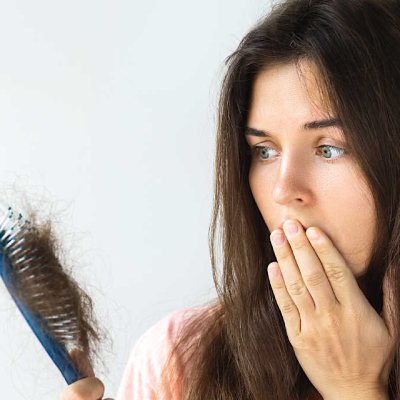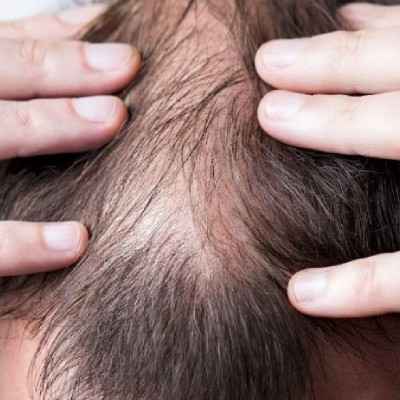How to Control Hair Fall During Monsoon

27 July 2022

Hair Experts @ AHS

Monsoon brings much-needed relief from the harsh summers. We all rejoice when the first drop of rain pours on us as it brings a transition in the weather, finally bidding adieu to the scorching heat & welcoming the pleasant skies. However, the humid rains also bring in a few challenges.
Monsoon brings much-needed relief from the harsh summers. We all rejoice when the first drop of rain pours on us as it brings a transition in the weather, finally bidding adieu to the scorching heat & welcoming the pleasant skies. However, the humid rains also bring in a few challenges.
Many people complain of hair fall during Monsoon. In most cases, this is true. The rainy season is notorious for causing skin and hair problems. The presence of moisture in the air may be temporary, but hair fall problems caused by it take a while to reset.
If you are searching for hair fall solutions to protect your mane during this Monsoon, keep reading this informative blog.
What causes Hair Fall during Monsoon?
It is common to experience some hair fall when the weather changes. This becomes more apparent when the Monsoon comes knocking on the door. Hair fall in Monsoon is a real issue for many. Wondering the cause of hair fall in Monsoon? Here’s why it happens:
**1. Excess moisture in the air**One of the most prominent reasons behind hair fall in the rainy season is the presence of excess moisture in the air. After the hot and dry summers, the Monsoon creates a sudden spike in the moisture levels in the air. This shocks the scalp and hair strands. As a result, they become weak and more prone to breakage. If you habitually tie your hair, you will experience more hair fall during Monsoon because the moisture will remain trapped in your strands. **2. Higher sebum production**
Our scalps produce extra oil known as sebum to deal with the Monsoon. Sebum is essential to protect hair follicles, but its excess can clog the pores. This causes further hair fall. You might be tempted to wash your hair regularly to deal with your greasy scalp, but this can stimulate your sebum glands further and require even more hair wash days! **3. Risk of scalp infection **
The above two issues create a perfect environment for yeast and bacteria to grow. This is why scalp infections are very common in the rainy season. These infections can cause both permanent and temporary damage to your hair. Therefore, you must be careful.
Hair Problems that Monsoons Bring Along
In addition to hair fall, the monsoon weather also brings other hair problems. Some of the most common hair problems during the Monsoon are:
1. Frizzy hair
2. Hair breakage
3. Oily scalp
4. Dandruff
5. Itchy scalp
All of these issues result from high moisture and humidity level in the hair. To avoid these, ensure that you keep your hair away from rainwater as much as possible.
How to Control Hair Fall During The Rainy Season ?
Hair fall control during the Monsoon does not have to be a complicated process. By making a few lifestyle adjustments and looking out for sudden changes in the hair loss patterns, you can easily deal with hair fall problems that tag along with this season. Here are a few general and home remedies for hair fall and regrowth during the monsoon season:
**1. Try fenugreek for a clean scalp**Fenugreek is more than a spice that is found in every Indian cabinet. It is rich in iron, protein, and other plant compounds that promote hair growth. Fenugreek is also good for taming dry and itchy scalp, which is very common during Monsoon. You can make fenugreek water and use it to rinse your scalp after a wash thoroughly. Since fenugreek also has conditioning properties, it will make your hair soft and supple. **2. Rosemary for hair growth**
Rosemary is called hair food for a reason. It is oozing with antioxidants that help in keeping the scalp healthy. Rosemary also helps with inflammation that can happen if you let the rainwater stay in your hair for long hours. This herb is also known to make circulation around follicles better. If you face heavy hair fall this monsoon season, consider rosemary oil for dry scalp and rosemary rinse for oily scalp. **3. Wash off rainwater **
It is fun to enjoy the rain but after a carefree moment, ensure you wash off the rainwater as soon as possible. Letting rain water stay in the hair for longer will make your hair greasier and cause hair breakage. If you can, try to avoid rainwater altogether. Carry an umbrella or a raincoat with you wherever you can! **4. Let your hair dry **
It is impossible to save your hair from ever getting wet in the rain during the Monsoon. If you cannot immediately shampoo your hair, then for hair fall control, you should always let your locks dry first before combing or tying them. Your roots are weak when they are wet. So, this will protect your hair. Moreover, by letting your hair dry before tying, you can ensure that your scalp is not susceptible to bacterial infection. **5. Use serums and leave-in conditioners**
Every time you step outside your home, use a serum or a leave-in conditioner for your hair. These products will protect your strands against rainwater and the excess moisture in the air that makes hair frizzy. **Also Read: Easy Hairstyles For This Monsoon Season !**
When Should I Consult a Hair Specialist?

Hair fall during Monsoon is common. Almost everyone experiences more than usual hair shedding during this time. Follow the steps mentioned above for hair fall control. However, if your hair fall is too much or you can see it affecting your hairline, it is better to discuss the issues with a hair expert at AHS India.
A hair specialist will analyze the reason behind your excessive hair fall and guide you on how to deal with it.
Advanced Hair Fall Treatment that Works Wonders!
There are many hair fall treatments that you can consider if you’re dealing with hair fall in Monsoon. However, if your hair fall is advanced, you have better chances of protecting your hair by opting for advanced hair fall treatments. Consult a hair specialist or go for a complete hair check-up. This will enable you to find the best hair fall solution.
Make sure you are well-informed before signing up for any invasive or non-invasive advanced hair fall treatment.
Conclusion
As the weather changes, your skin and hair suffer the most. If you face hair fall during Monsoon, don’t worry because you are not alone. While it is common to shed more than the usual amount of hair strands during this season, you should speak with a hair specialist if the hair fall is excessive.
At Advanced Hair Studio, we prioritize your hair care. Before we begin any process or curate a hair fall treatment for you, we ensure that we have found the root of the problem. Your hair is always in expert hands. Give us a call today to fix a consultation with a hair expert!
FAQs:
1. **How to Determine If Your Hair Loss is Normal, or is there any other reason?**Everyone sheds hair daily. If there is a sudden rise in your shedding patterns or there is a noticeable change in your hairline, there might be other causes for hair loss.
2. **Is Hairfall Normal in Monsoon?**
Yes, hair fall is normal in Monsoon. Most people experience more than usual hair fall during this season.
3. **Does hair fall increase in July?**
India is a tropical country that receives rainfall in the months of July and August. This is called the Monsoon. Generally, people experience more hair fall during this time.
4. ** In which season does hair fall most in India?**
In India, most people experience hair fall during the monsoon season.
5. **Is losing 150 hairs a day normal?**
Shedding nearly 100 strands of hair daily is normal, but anything more than that is not normal.
6. **Is excessive hair fall common during Monsoon?**
Yes, excessive hair fall is common during Monsoon.
7. **What should I eat to avoid monsoon hair fall? **
Eat iron, Vitamin B, protein, and zinc-rich food to strengthen your hair. You should also stay hydrated.
Stay Updated
Subscribe to our email newsletter for helpful tips and valuable resourses
Be an influencer
Join forces with Advanced Hair Studio! Explore exciting collaboration opportunities tailored for influencers. Let's redefine haircare together.
Connect now












